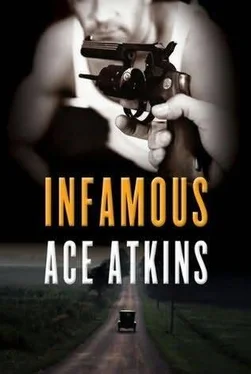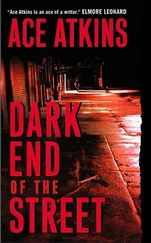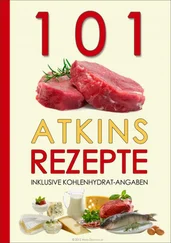But nothing could save them. Even Chingy would’ve been convicted in that lousy court. She knew it was all a sham when they rode the elevator up for sentencing. She turned to kiss George on the cheek, but that cowboy federal agent Doc White pushed her away. And like he deserved, she slapped that old bastard across his face.
He grabbed her hand and snatched her up at the elbow.
In manacles, George turned to try and break his grip. But all that old man did was pistol-whip George till the elevator doors opened, leaving him with a good-size egg and a handkerchief on his split lip as their verdict was read.
They were sentenced to life.
When Kathryn was released twenty-five years later, she remarked to a reporter, “I guess the thing that impressed me most on my first trip out was the fast traffic. I was honestly afraid to cross the street.”
George never did get out.
September 1934
The train was a midnight special, taking the highball route from the federal prison in Atlanta, tracks cleared all the way to Leavenworth, and then steaming right for the California coast, where a hundred and three of the very worst in the system would be locked up tight on Alcatraz. Hoover had put Jones in charge of the move, and he hadn’t even been able to tell Mary Ann his assignment, only saying that he’d meet her in San Francisco at the Mark Hopkins Hotel. They’d have cocktails, and she’d try to talk him into retiring like Doc White.
The train’s windows had been covered with bars and a metal screen, and the doors could only be unlocked from outside, the openings covered in welded lattice, easy to slip the muzzle of a machine gun through and start shooting if there was trouble. By morning, they all felt the heat wave without even a small crack for a crossbreeze. Some of the men went on a hunger strike, most of them unshaven and stinking. Many he knew on sight- Bailey, Bates, Kelly -as he patrolled the aisle with a Thompson in hand. George Kelly nodded to Jones every time he passed, like an old friend, asking him once, when they stopped in a train yard to let the prisoners stretch, smoke, and drink water from tin cups, if it would be okay to write Charles Urschel a letter.
“I don’t think it’ll change his mind.”
“It’s not supposed to,” George said. “I just want someone to hear me out.”
“Maybe try a more cordial tone this time.”
“You know I didn’t have a thing to do with that mess in Kansas City.”
Jones nodded. “We got Miller’s prints off the gun.”
“Guess he won’t be facing the chair.”
“Facedown and nekkid in a drainage ditch,” Jones said. “Why do you figure they had to make him be nekkid before they killed him?”
“Nitti wanted to shame him,” Kelly said. “He’d like you G-men to lay off the Syndicate. Never were fond of the freelancer.”
“I know Bailey was there, too,” Jones said. “Someone knows. We got him. And we got time.”
“Hell, he didn’t kidnap Charlie Urschel,” Kelly said. “He was framed for that.”
“Ain’t it a shame.”
Dear Mr. Urschel-
I hope I am not pulling a prize blunder (or should I say committing a “ faux pas”?) in writing to you. Don’t think I am merely writing this letter to try to get into your good graces. You can rest assured I will never ask you to do anything towards getting me out.
I feel at times you wonder how I am standing up under my penal servitude, and what is my attitude of mind. Maybe you have asked yourself, “How can a man of even ordinary intelligence put up with this kind of life, day in, day out, week after week, month after month, year after year.” To put it more mildly still, what is this life of mind like-and from whence do I draw sufficient courage to endure it.
To begin with, these five words seem written in fire on the walls of my cell: “Nothing can be worth this.” This-the kind of life I am leading. That is the final word of wisdom so far as crime is concerned. Everything else is mere fine writing.
“What are you going to do when you get us all locked up on that island?”
“Plenty,” Jones said.
“Won’t be long till you nab every yeggman in the country.”
“Worse headed this way.”
“The Depression?”
“Worse than the Depression,” Jones said. “The country has worse problems than a bunch of hoods with guns.”
“Like what?”
“The Germans, for one. Filthy Nazis. Did you know that son of a bitch Hitler won’t let churches use ‘Amen’ because it’s a Hebrew word. That ain’t right.”
“And you can’t wait to fight ’em.”
“Won’t be long till they’ll be coming for us.”
“That’s screwy.”
“Our borders are wide open,” he said. “They’ll look to Mexico.”
“And you’ll take up the gun.”
“If it comes to that,” Jones said. “I can speak Spanish.”
I feel splendid and am in perfect physical trim. My one obsession is the climate of this island. I am constantly bothered with colds. My cell, made of steel and concrete, is always a trifle chilly; but I’ve come to believe that man is so made that the presence of a small superficial irritation, provided the sensation is acute without being symptomatic of any serious trouble, is a definite aid to his mental equilibrium and serves to keep occupied the restless margin of his consciousness. He regards it, too, as a sort of ring of Polycrates, for I suspect that there is in all of us, always, an obscure sense of fate, inherited from numberless ancestral misfortunes, which whisper: “We are not sent into this world to live too happily. Where there’s nothing to worry us, it’s not natural, it’s a bad sign.”
“You know she wrote me in Leavenworth,” Kelly said, the morning clear and bright. They ate their eggs with plastic utensils. “The lawyer we hired sued for all the jewels and furs. That big, gorgeous Cadillac, too. She had a sixteen-cylinder engine. You could steer clear across this country like that car was a yacht.”
Jones nodded, watching him eat, holding the Thompson over him.
“She told me she still loved me,” Kelly said.
“Yeah, I read that letter. You know your mail’s censored? I think she was hoping you’d help bust her out.”
“That might be a little tough,” Kelly said, raising his manacled wrists.
“They put her in prison with her momma,” Jones said. “That has to give you some comfort.”
“You think she used me?”
“You want to know the truth, son?” Jones asked.
But I must be fair. Being in prison has brought me one possible advantage. It could hardly do less. Its name is comradeship-a rough kindness of man to man: unselfishness; an absence, or a diminution, of the tendency to look ahead, at least very far ahead; a carelessness, though it is bred of despair; a clinging to life and the possible happiness it may offer at some future date.
A person in prison can’t keep from being haunted by a vision of life as it used to be when it was real and lovely. At such times I pay, with a sense of delicious, overwhelming melancholy, my tribute to life as it once was. I don’t believe it can ever be like that again-but you can bet your last oil-well George won’t lose any sleep over that.
How’s your bridge game? Are you still vulnerable? I don’t mean that as a dirty dig, but you must admit you lost your bid on the night of July 22, 1933.
I hope you will not consider my writing an impertinence, if you do, just tear this letter up and forget it. With best wishes, I am
Very truly yours,
George R. Kelly
Reg. No. 117
The seats in the train jostled up and down, metal wheels scraping against rails, anonymous towns of light and smoke flying by the windows, just slightly cracked. Jones sat across from George Kelly on that final stretch, having so many questions about him and Kathryn but deciding what went on with his woman was of a personal nature. He got his pipe going and stretched out his shined boots, the front of his shirt clinging to him, with sweat drying in the coolness of the night.
Читать дальше












